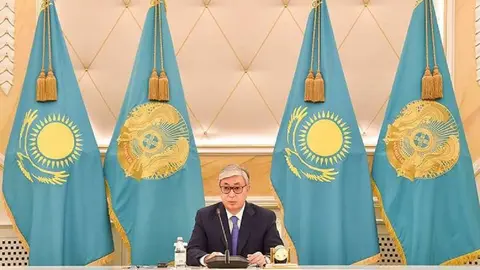Kazakhstan's prospects for 2025: ‘Strengthening the economy, sovereignty and its external position’
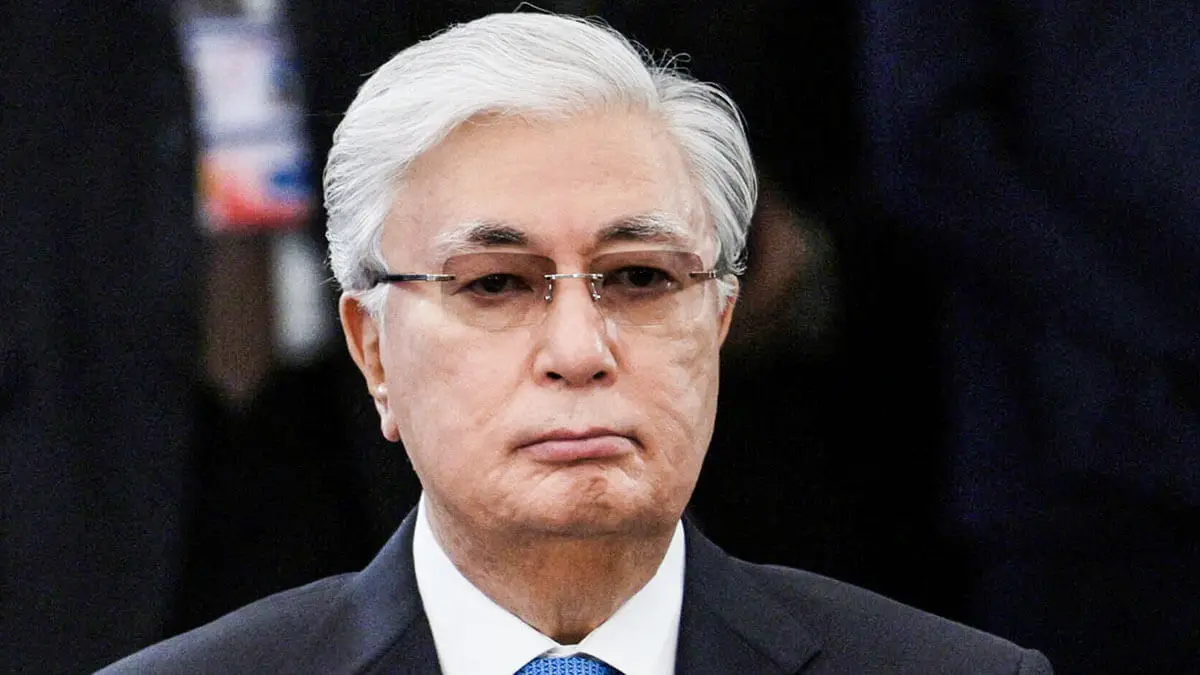
- Economic reform process in 2024
- Improving legislation: further legislative reforms
- An economy tending towards liberalisation and adaptation to the economy with a strong social accent
- A country where youth is a priority
- Promoting the Kazakh language
- Government projects for 2025
Moreover, these reflections are confirmed by my various visits, study and regular monitoring of the reform process initiated by the second president of the new Kazakhstan since the presidential elections of 12 June 2019 in which I had the privilege of being an international observer.
In this regard, Kazakhstan, a country located in Central Asia, the largest and most developed economy in the region, gained its independence from the USSR on 16 December 1991. A new state is making a successful transition under the leadership of the first president and Elbassy (leader of the nation), Nursultan Nazarbayev. A politician during whose tenure a strong state was created, government institutions were established, a new capital was built, the country's borders were legally defined, beneficial cooperation with many countries was promoted and numerous foreign investments came into the country.
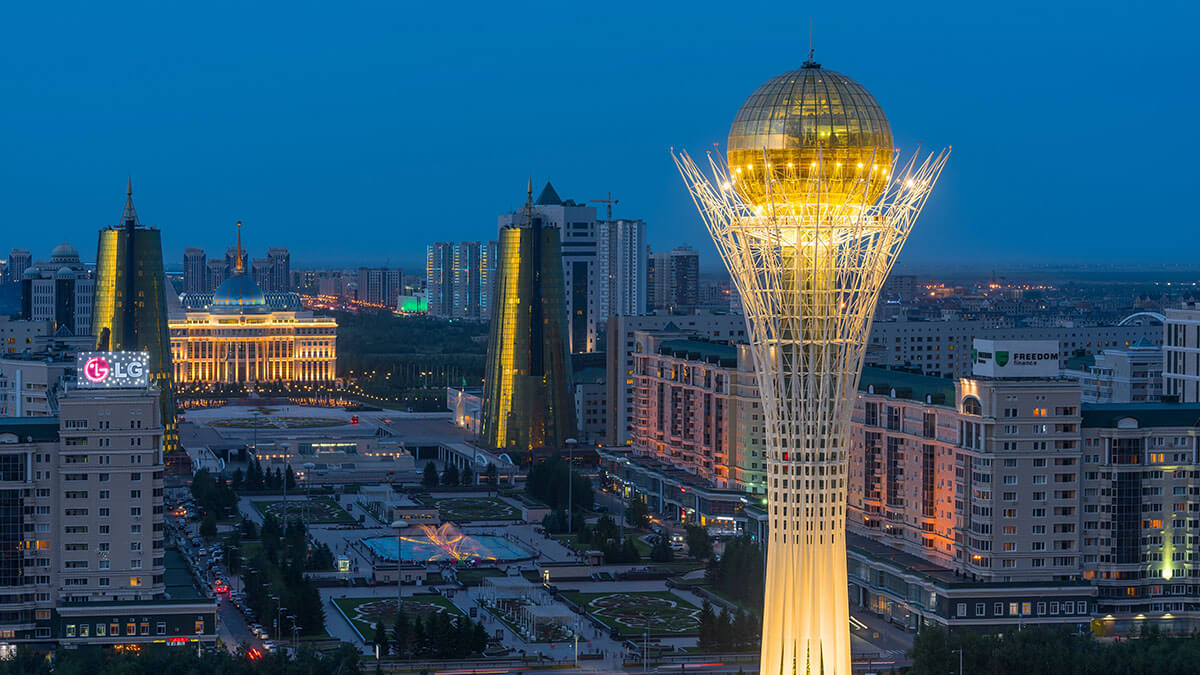
Like any long historical period (1991-2019) it has its lights and shadows, as is the case with the reign of our former head of state, H.M. King Juan Carlos I. We also had an attempted coup d'état on 23 February 1981. There were still deep misgivings within the previous regime. Juan Carlos I was able to unite all the political forces around his leadership and the new Constitution of 1978 and carry out a model transition to democracy.
In Kazakhstan, President Kassym Khomart Tokayev, despite the historical, cultural, and idiosyncratic differences between our two countries, is doing a similar job, even though he also suffered a coup attempt in January 2022 and has been able to lead a profound process of economic, institutional, legal, and constitutional reforms. A state with a presidential political system that has gradually given the bicameral parliament, the Senate (upper house) and the Mazhilis (lower house), greater functions and influence. Territorially, it is a unitary state consisting of 17 provinces (oblystar) and three independent cities (qalalar), namely Astana, Almaty, and Almaty: Astana, Almaty and Shymkent, which have a state character. In addition, the city of Baikonur is administered by Russia under an agreement that ends in 2050. There is a slow takeover of competences by the regions and a more participatory and democratic process of electing governors and mayors is still being implemented.
In the words of President Tokayev and according to his own definition, a political system with ‘a strong president, an influential parliament and a responsible government.’
Economic reform process in 2024
Thus, in 2024, a modernisation of the public utilities and engineering infrastructure was carried out in all regions of the country. Eighteen million square metres of housing were built, 7,000 kilometres of roads were constructed and repaired, new passenger terminals were opened at the airports in the cities of Almaty, Kyzylorda and Shymkent. Major projects in the petrochemical, metallurgical and mining industries were implemented in one year.
It should be noted that the manufacturing sector has developed significantly and has reached the same level in the country's industrial structure as the extractive sector. In addition, the agricultural sector has undergone major technological modernisation, with a record harvest in the last 10 years of almost 27 million tonnes of grain. The country has carried out systemic economic reforms, which in some cases have been harsh and painful, but which show that they are bearing fruit in the country's five-year development.
Social reforms in 2024
Some examples of these are the support for families through the ‘National Fund - for Children,’ as well as an increase in pensions, allowances, scholarships, salaries for civil servants. Hundreds of new schools, kindergartens and sports complexes were built all over the country, and more than ten branches of prestigious foreign universities were opened. The development of mass sport and the strengthening of the creative potential of citizens were also supported.
2024 was also a difficult year for the country: in the spring, the country was hit by floods that affected half of the country's regions.
After a positive response to the disaster in terms of the speed of the response, the provision of resources and the mobilisation of troops from various ministries (Defence, Interior, Emergency Situations, etc.), mobilising some 63,000 troops. The government has been deeply reflective and self-critical, recognising that many consequences could have been avoided if due attention had been paid in recent decades to the construction of protective dykes and other hydraulic infrastructures.
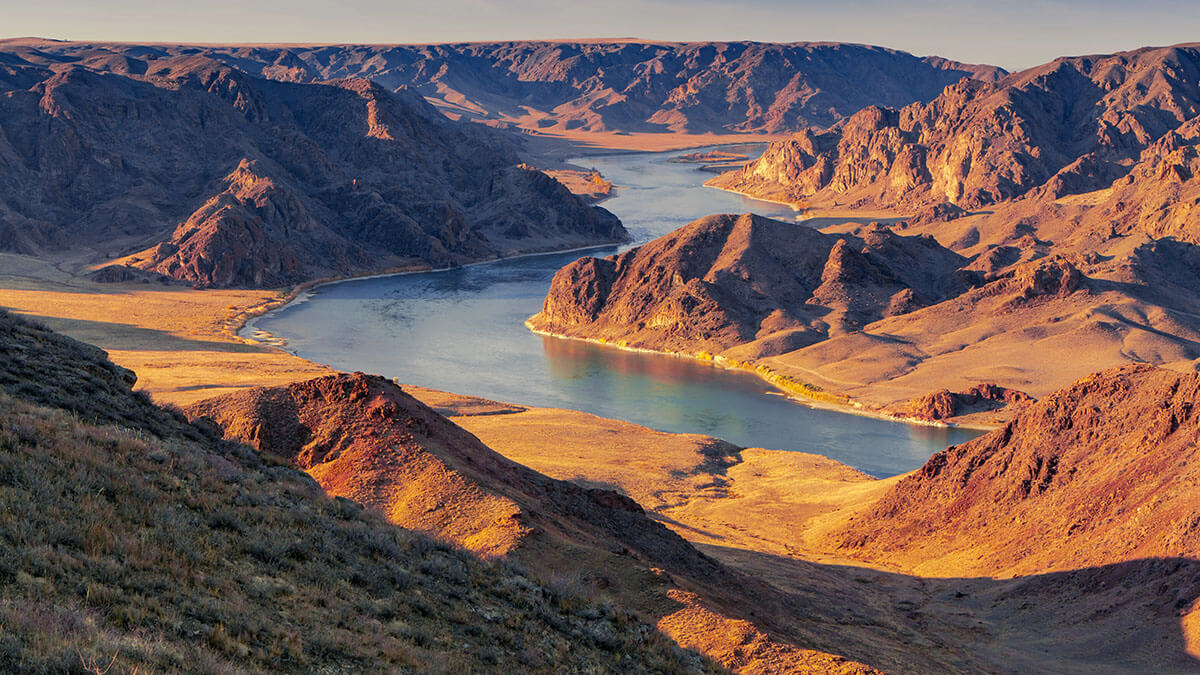
Let us hope that our authorities will draw conclusions also after the DANA in Valencia. In Kazakhstan, a new draft Water Code is under review in Parliament, a new comprehensive plan for water resources management, which envisages the construction of more than 40 new reservoirs and the rehabilitation of the 37 existing ones in the country, and the modernisation of more than 14,000 kilometres of irrigation canals. The Kazakh National University of Water Resources and Irrigation has also been established to strengthen research and address the shortage of water specialists. An example of Kazakh leadership in this area was the One Water Summit held in Saudi Arabia in early December under the leadership of France and Kazakhstan. This shows that water security and climate change issues are priorities for the Central Asian country.
The solidarity and transparent response to the crash of the Azerbaijan Airlines flight
Kazakhstan also responded effectively and in solidarity to the 25 December crash of an Azerbaijani airliner in the city of Aktau, Mangystau region, which killed 38 passengers, including six Kazakh citizens. A governmental commission was organised. Seventeen international experts were invited, including representatives of ICAO and the Interstate Aviation Committee. The commission decided to send the black boxes of the crashed plane to Brazil, where the aircraft had been manufactured, for decryption, to ensure impartiality and objectivity in the investigation.
Reforms for transparency, human rights, and the rule of law
On the other hand, the country continues to make progress in favour of transparency, human rights and the rule of law, as demonstrated by the commissions of enquiry to respond to Kazakh society and the international community to the events of January 2022, known as the ‘Qantar events’, which were particularly virulent in the cities of Aktau and Almaty.
These protests used social unrest over gas prices to trigger an attempted coup d'état against the constitutional order. Fortunately, order and stability were maintained, and decisive decisions were taken against the organisers of the riots and the coup plotters to return to normality. Only through ‘Law and Order’ where there is respect and rule of law can a truly just and democratic state be built. Undoubtedly, Kazakhstan is now a more independent and sovereign country even in today's turbulent geopolitical times. All these reforms must take root in the Kazakh value system and become part of the mentality of the population and public life, as laws must be respected by all, by citizens and by the public authorities.

An effective fight against organised crime and banditry is also underway, as evidenced by the arrest of those involved in the murder of 16-year-old Sherzat Bolat in the village of Talgar, northeast of Almaty, while he was defending his father from an attack on his shop by fiends. The case has shocked Kazakh society.
In the fight against corruption, the state is working on crime detection and risk prevention in this area through an approach that reflects the best international standards, including those developed by the OECD.
Improving legislation: further legislative reforms
At various meetings of the National Kurultay (National Council), the consultative body of the President of Kazakhstan, which includes representatives of civil society and experts, new laws were proposed, adopted and promoted in a clear example of productive collaboration between the state and society in the improvement of legislation: a law on the protection of women's rights and children's safety; a new law for a new voluntary Keleshek savings system; a law for the reduction of citizens' over-indebtedness; a law banning the sale and distribution of electronic cigarettes; a significant tightening of penalties for drug production; a law to combat compulsive gambling; stiffer penalties for vandalism of property and violent behaviour.
Also, a major reform of the judicial system as of 1 July 2025, where three independent courts of cassation will be created, i.e. for civil, administrative, and criminal matters. The aim of this new system of specialised courts is for citizens to be able to turn to them when their rights are violated by state bodies. This spirit of reform is and will continue to be an integral part of state building.
Let us recall that this reformist impulse initiated by President Tokayev in 2019, had in June 2022, a very significant support a high official turnout of 68 % and with 77.1 % of the participants of the participants voting in favour of the changes, which introduced important changes in the institutional balance of existing powers especially by reducing the power of the president and strengthening the functions of the Parliament. These new constitutional provisions resulted in early parliamentary elections on 19 March 2023 in which the Amanat party (former Nur-Otan) won the majority with 53.90% of the votes, i.e. 64 seats out of 98 deputies in the Mazhilis (the lower house of Kazakhstan). These were elections implementing modifications to the electoral system to allocate seats through a mixed (partly proportional and district) system.

An economy tending towards liberalisation and adaptation to the economy with a strong social accent
Measures are also being taken to support the national currency and various exchange rate, and economic measures are being analysed to avoid the pressure it is under against the dollar. And a fight against corruption and the recovery of illegally obtained financial and other assets has been underway since 2022, resulting in the return of more than 2 trillion tenge, or $4.1 billion, to the state treasury, which is being invested in social policy.
An economic system that guarantees free private initiative and legal certainty. A policy of fair distribution of national wealth, which does not involve expropriation or forced distribution of property or assets. Equality of competition and opportunities is sought.
In the economic field, the government has asked for more autonomy in the decision-making process and after one year the country is growing at 4%. The country is growing economically and improving the welfare of citizens. The main goal of the government is to ensure stability, promote dynamic development, economic efficiency and increase labour productivity and create quality jobs. President Tokayev maintains a demanding stance towards the government in achieving these goals.
A country where youth is a priority
When you walk through the streets of Astana and especially Almaty, the country's green and park-like city, you can see many young couples with several young children, students, and children.
Kazakhstan is a country with great human capital in its youth. And this importance is seen as the essence of the country's strategy. The formation of the new generation with an active sense of patriotism and a high cultural level. There are many young Kazakhs today who travel to study or work. I have met Kazakh students who were studying at the University of Santiago de Compostela, the San Pablo-CEU University, or the Instituto de Empresa University, among others. The Kazakh state encourages the training of its young people abroad through the ‘Boloshak’ international scholarship, as well as internship programmes for young scientists in research centres abroad and student exchanges with different countries, for example, through the European Union's Erasmus+ programme.
It is also a way of projecting Kazakhstan's brand in the world. The Kazakh government is trying to create conditions for these specialists to work in the country or to return after additional training abroad to prevent a brain drain. The year 2025 has been declared the Year of Technical Professions, where young people should lead the way.
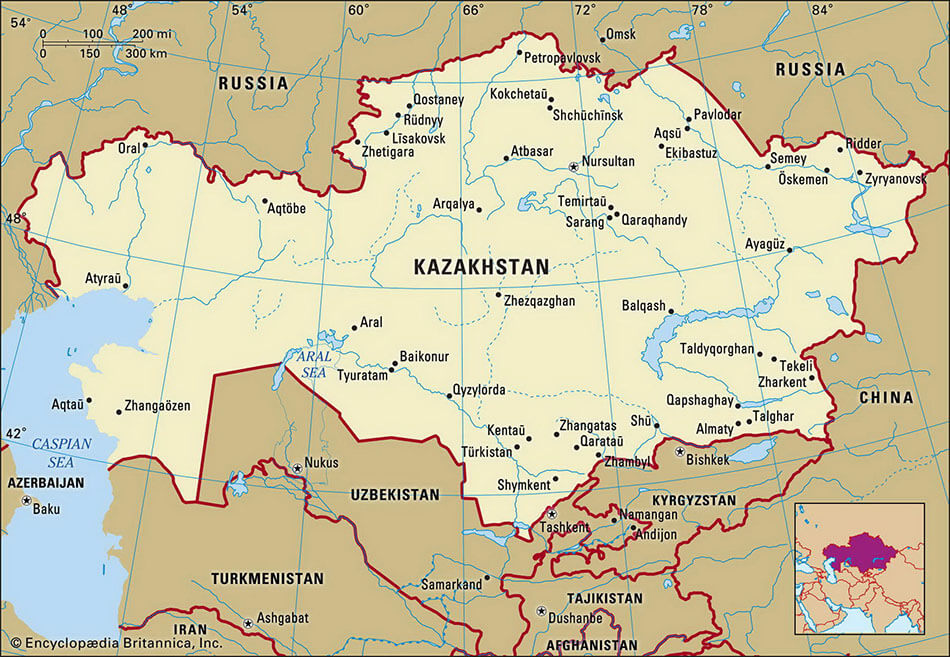
Promoting the Kazakh language
The Kazakh language ranks 79th among the world's most widely spoken languages and is subject to special protection. There is a special fund for protection and promotion at the initiative of the Kazakh Language Society. Special attention is being paid to the incorporation of its use in innovative technologies (an artificial intelligence tool has even been created in the language). The Kazakh language plays an essential role in consolidating the unity of the Kazakh people. It is a ‘fashionable’ language among young people who consider its knowledge to be a key factor in their professional growth and success.
Ecology and sustainability as a social awareness policy: the ecological campaign ‘Taza Qazaqstan’ or ‘Clean Kazakhstan’ and nuclear energy.
More than 3.8 million people participated in the campaign, more than 3.2 million trees were planted, and more than 1.5 million tons of rubbish were collected. Responsibility for implementing the programme rests with the akims (mayors), but it has relied on the cooperation of citizens. This is essential if such initiatives are to take root in society.
In Kazakhstan, now, after an intense debate, a single time zone has been established following the recommendations of the Barcelona Declaration on Time Policies for a healthier life. A thorough reflection and debate are being carried out with the participation of experts, scientists, and regional representatives to make the best possible consensual decision in a balanced way.
Regarding nuclear energy, a national referendum was held in the country on 6 October 2024 on the question: ‘Do you agree with the construction of a nuclear power plant in Kazakhstan? Of the 12.2 million voters on the electoral roll, 8 million citizens (two-thirds of the electorate) took part in the vote. The Yes vote won with 71.12% of the electorate. Those who voted yes did so with the conviction of achieving energy independence and security and the reduction of electricity imports from Russia.
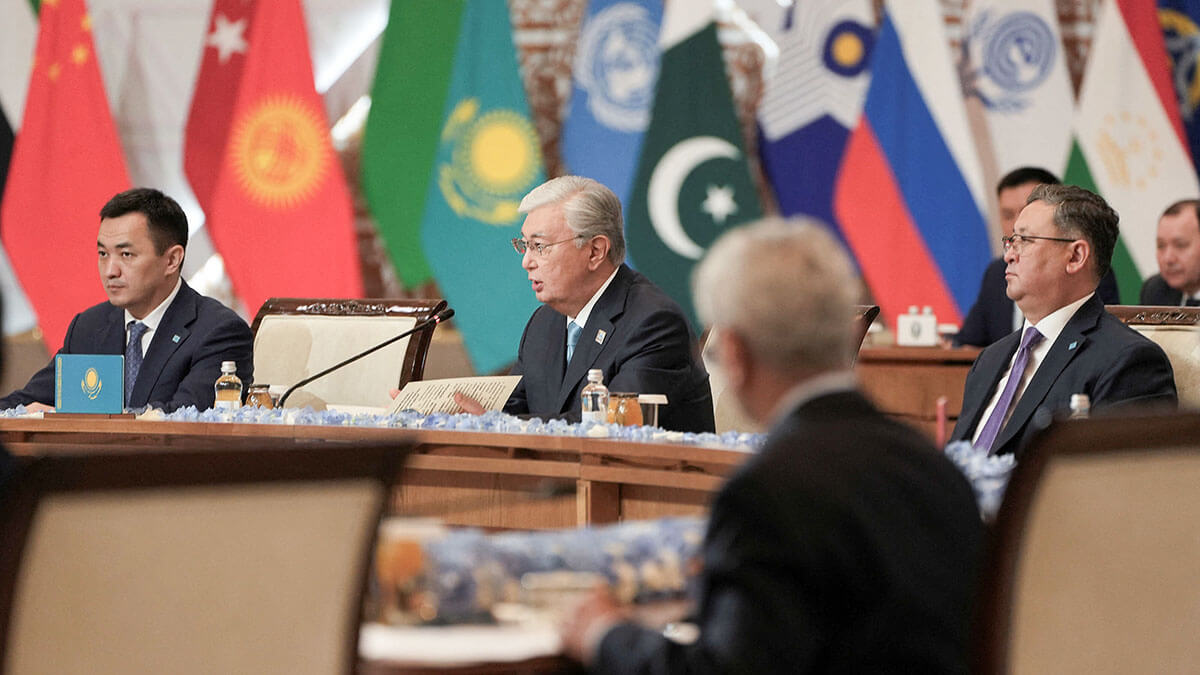
The construction of a nuclear power plant is a sensitive issue in Kazakhstan, as thousands of people are still suffering the consequences of the half a thousand atomic tests carried out during the Cold War in Semipalantinsk in the north-east of the country.
At present, the country's energy mix is 80 % dependent on coal mines (a highly polluting sector), 15 % on hydroelectric plants and 5 % on renewable energies.
In 2025, tendering procedures will be carried out in which the idea is to create a consortium, where the general operator will be the Kazakh side as the customer of the project. The Russian company Rosatom, the Chinese company CNNC and other foreign companies such as South Korea's KHNP, including Western companies such as France's EDF, have shown interest in the project. Moreover, Kazakh President Tokayev does not rule out the construction of a second or even a third nuclear power plant given the energy deficit the country is facing. Russia's Rosatom is building a nuclear power plant in neighbouring Uzbekistan. An international consortium could be involved. It should be remembered that Kazakhstan is the world's largest uranium producer.
Government projects for 2025
Transport infrastructure
In the summer of 2024, a new National Infrastructure Plan was approved for five years, i.e. until 2029; it foresees more than 200 projects with an investment of more than 40 billion tenges. These include: 1) In the railway sector, the completion of 836 km of the second track of the ‘Dostyk-Moyynty’ railway section, the bypass of Almaty station and the continuation of the renovation of the wagon fleet.
Energy sector
In the energy sector, major projects of more than 600 megawatts will be developed. Green energy will also receive a significant boost as agreements have been concluded with foreign investors to build solar, hydroelectric, and solar power plants. The construction of the Tengiz Field Future Expansion Project and the expansion of the production capacity of the Aktau bitumen plant will be completed.
It is in Aktau that Tecnicas Reunidas is participating in the construction of a petrochemical plant in the Morport Aktau Special Economic Zone of Manguistau, which is set to become the largest producer of mineral fertilisers in Kazakhstan. The Taldykorgan-Usharal main gas pipeline, the fourth line of the Zhanaozen-Aktau gas pipeline and an automated gas distribution station in the Atyrau region will be put into operation.
Automotive
The mechanical engineering industry will continue to develop. New car production lines of world leading brands will be opened. The production of iron castings for internal combustion engines and drive axle components will start in Kostanay.
Social sector
Regarding social infrastructure, the implementation of the national rural health modernisation project will continue, with the construction of medical facilities in rural areas, the construction of 217 rehabilitated schools (105 have already been completed) to provide pupils with good learning conditions.
In addition, new housing will be built to increase accessibility, and 10,000 rental housing units will be promoted every year until 2029. To this end, Obasý Bank will become a development institution that will manage registration and distribution through a one-stop-shop system. The budget of the Republic of Kazakhstan for 2025-2027 maintains its social focus with significant investments in education, health, and social needs.
Digitalisation
According to the UN ranking, Kazakhstan ranks 24th in e-government development worldwide. Kazakh banks are creating their own digital ecosystems. The country is increasing the export of IT services, and the Astana Hub is operating successfully.
One of the country's goals is also to become one of the leading digital centres in the Eurasian space by opening an International Centre for Artificial Intelligence (Alem.AI) in Astana. By the year 2024, 15 universities in the country will already be teaching Google's AI courses. Kazakhstan is becoming an increasingly attractive destination for so-called global digital nomads. Currently, the deputies of the Parliament have started drafting a law on artificial intelligence.
Entrepreneurship
A law on entrepreneurship aimed at creating favourable conditions for entrepreneurs has recently been adopted. The Kazakh state supports SMEs through subsidies, credit guarantees and preferential loans. This sector employs almost 4.3 million people (almost half of the country's workforce). The state is also interested in the development of large enterprises. There is also a good public-private partnership in the social field. Numerous foreign companies are also opening offices in Kazakhstan, which is leading to an internationalisation of the Kazakh market.
Recently, the UN Economic and Social Commission for Asia and the Pacific in its 2024 report highlighted that Kazakhstan had 15.7 billion dollars of foreign direct investment for new projects last year, i.e. an increase of 88% compared to 2023. This indicator shows that almost two thirds (63%) of foreign direct investment in the Central and North Asia region took place in Kazakhstan.
Year dedicated to the celebration of the 80th anniversary of the Great Victory
The commemoration of the victory over Nazism in World War II will be high on the state's agenda. It should be remembered that the Kazakhs made an outstanding contribution to the defeat of Nazism by fighting heroically on all fronts, as well as by supplying armaments, industrial goods, and foodstuffs to the Army of the Soviet Union, of which the then Kazakh SSR was a part.
Its consolidation in the international community as a constructive actor in the establishment of peace dialogue
We must bear in mind that geography in politics and in the field of international relations is key, and Kazakhstan is located in the middle of Central Asia, between Russia and China, and is therefore no stranger to unprecedented global geopolitical tensions where there are also other powers with interests in the region in addition to those mentioned above, such as the United States, the European Union and Turkey itself, with which Kazakhstan also has deep historical cultural ties. Since the beginning of the war in Ukraine, Russian influence in the country has diminished, but the years of Tsarist and Soviet influence have undoubtedly lingered on.
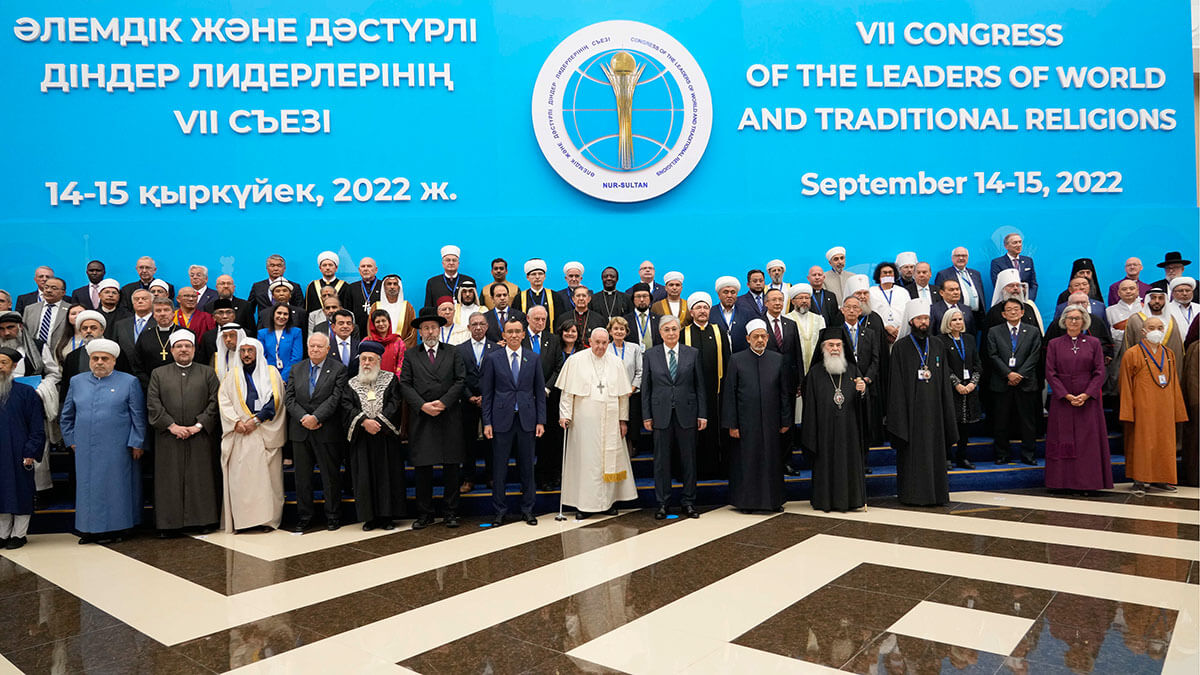
Nevertheless, in this complex scenario, Kazakhstan has maintained an intelligent, multivectoral foreign policy, asserting its sources of wealth based on hydrocarbons, gas, and oil, but also diversifying its economy in other critical areas such as those listed above. Kazakhstan is a member of the OSCE (Organisation for Security and Cooperation in Europe), the Collective Security Treaty Organisation (CSTO), NATO's Partnership for Peace and the Shanghai Cooperation Organisation (SCO) because of this responsible multi-vectoral foreign policy as a middle power member of the international community.
President Tokayev believes that the system of international relations is in crisis and instability among the major powers is increasing. A UN Security Council that is, in practice, paralysed. All this affects and hinders the economic and social development of many countries. Therefore, Kazakhstan as a rising middle power can play an active role together with other middle powers, building solid bridges between the conflicting geopolitical poles and contributing to reducing the level of confrontation globally.
Bilateral relations with Russia
The two countries are linked by historic economic and cultural ties. They also share the world's longest land border.
In November 2024, the Russian President paid an official visit to discuss the bilateral agenda in the trade, economic, transport and coordination, energy, cultural and educational sectors. The dialogue strengthened mutual understanding of the current problems of bilateral cooperation and the international agenda.
And the Kazakh President had the opportunity to explain the principles of Kazakhstan's multilateral foreign policy compatible with a strategic partnership and alliance with Russia. Vladimir Putin was accompanied by almost half of the Russian government, which demonstrates the importance Russia attaches to Kazakhstan in the current context. The Russian president has also visited Kazakhstan 33 times, and Kazakhstan is the country he has visited most often. Both countries are fundamental to the stability of Eurasia.
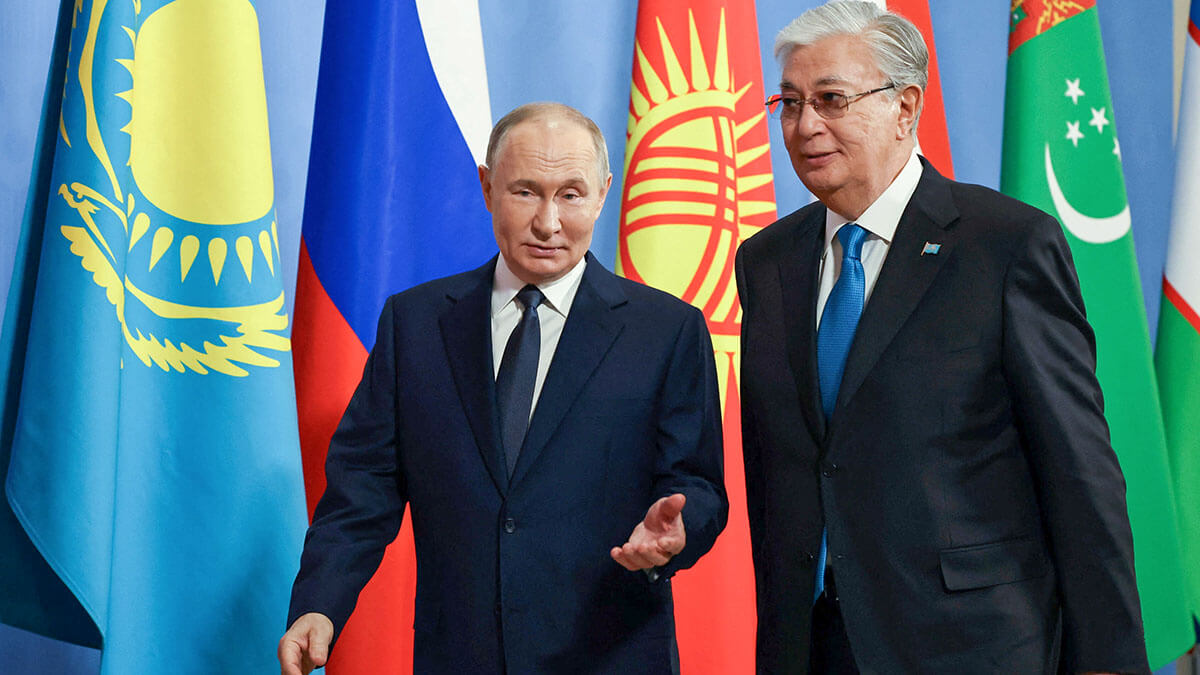
Relations with the People's Republic of China
In 2023, Kazakhstan and China agreed on a mutual visa-free regime, and continued development of cooperation is a central task of Kazakh diplomacy. China is Kazakhstan's largest trading partner and one of the biggest investors in the country's economy. There is a willingness by both countries to double their mutual trade.
The Central Asia-China summit will take place in Kazakhstan this year. The two countries have a dynamic and multifaceted relationship, which could be summed up as an eternal strategic partnership. It is worth noting that Kazakh President Tokayev is fluent in Chinese, and this facilitates his special relationship with President Xi Jinping.
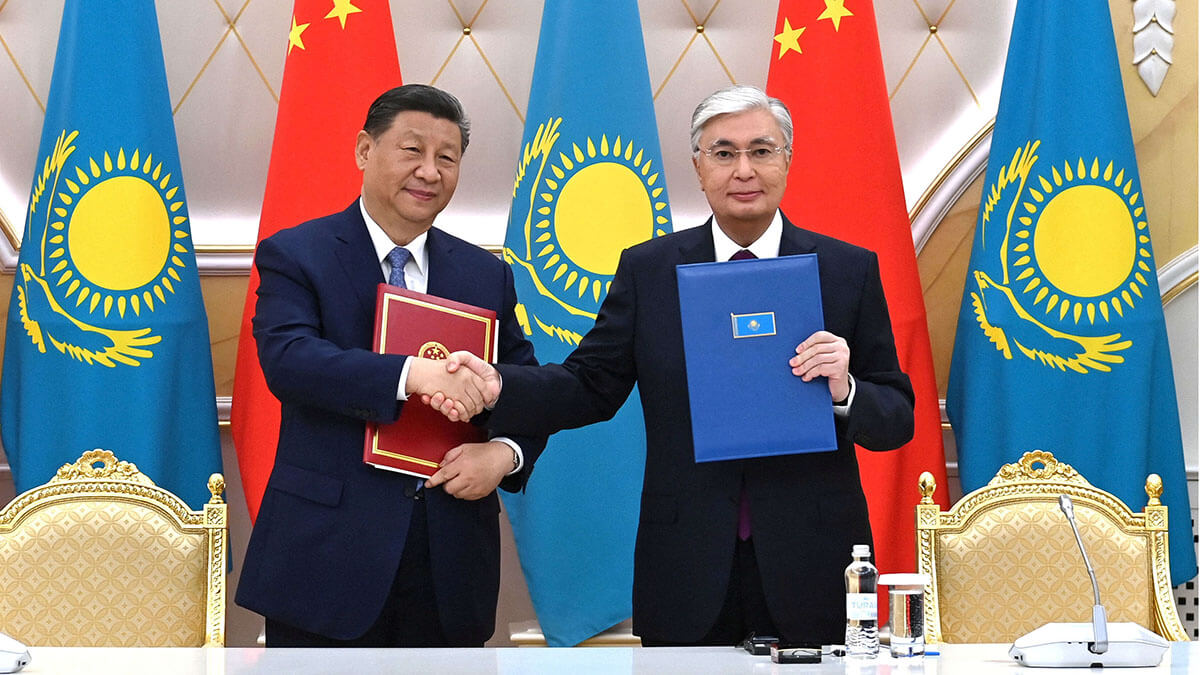
Bilateral relations with the United States
Kazakh President Tokayev has had the opportunity to participate in the establishment of Kazakh-US relations since the mid-1990s. These three decades have seen the development of a shared vision of priorities between the two countries: trade and investment cooperation, security, and non-proliferation of nuclear weapons. These areas are the pillar on which future relations between the two countries, and thus with the new Trump administration, will be built. Kazakhstan is an important strategic partner of the US.
Regarding the war in Ukraine, Kazakhstan has been an advocate of peace negotiations since the beginning of the war, and the country is always ready to assist in the resolution of international problems.
Cooperation with Turkic states
Last year, when the organisation's 15th anniversary, Kazakhstan chaired the Organisation of Turkic States (OTS), of which it was one of the founding members in 2009.
In 2024, the volume of mutual trade between the members of the organisation exceeded 45 billion dollars (about $140 per person in the US). The significant role played by these countries in the implementation of the Trans-Caspian International Transport Corridor should be noted. During the Kazakh leadership, cooperation in political, economic, trade, transport, coordination, cultural and humanitarian areas was intensified.
The countries of the Turkic community plan to expand their cooperation in fields such as energy, industry, digitalisation, and agriculture. The 5th World Nomad Games were held in Astana from 8 to 13 September. The presidency's motto was ‘TURKTIME,’ an abbreviation that summarised its eight priorities: Traditions, Unification, Reforms, Knowledge, Trust, Investments, Mediation and Energy.
Cooperation with the European Union
It should be noted that their relations are based on the 2015 Enhanced Partnership and Cooperation Agreement signed between the EU and Kazakhstan ten years ago in Astana. It is also based on the EU's overall Strategy for Central Asia. The European Union is the first trade and investment partner in Kazakhstan, supporting the economic reforms and modernisation policies being led by President Tokayev.
On 14 October 2024, the 20th EU-Kazakhstan Cooperation Council took place in Luxembourg. At this meeting, both sides confirmed their willingness to broaden and deepen their partnership and to analyse and develop the full potential of the Enhanced Partnership and Cooperation Agreement. The risk of misinformation and misinformation was discussed. The European Union highlighted the excellent cooperation with Kazakhstan during its membership of the UN Human Rights Council in the period 2022-2024.
The enhanced cooperation between Kazakhstan and the EU also aims to strengthen transport connectivity, notably through the Trans-Caspian Transport Corridor project within the framework of the EU's Global Gateway strategy. Kazakhstan also took an active part in the high-level political inauguration event that took place in the Turkmen capital Ashgabat on 3 October 2024 in the presence of the then European Commissioner for International Partnerships, Jutta Urpilainen. In addition, the EU and Kazakhstan have initialled a horizontal aviation agreement in the margins of the Cooperation Council. In addition, the two sides cooperate on key and critical raw materials, and a new roadmap for the period 2025-2027 is expected to be agreed.
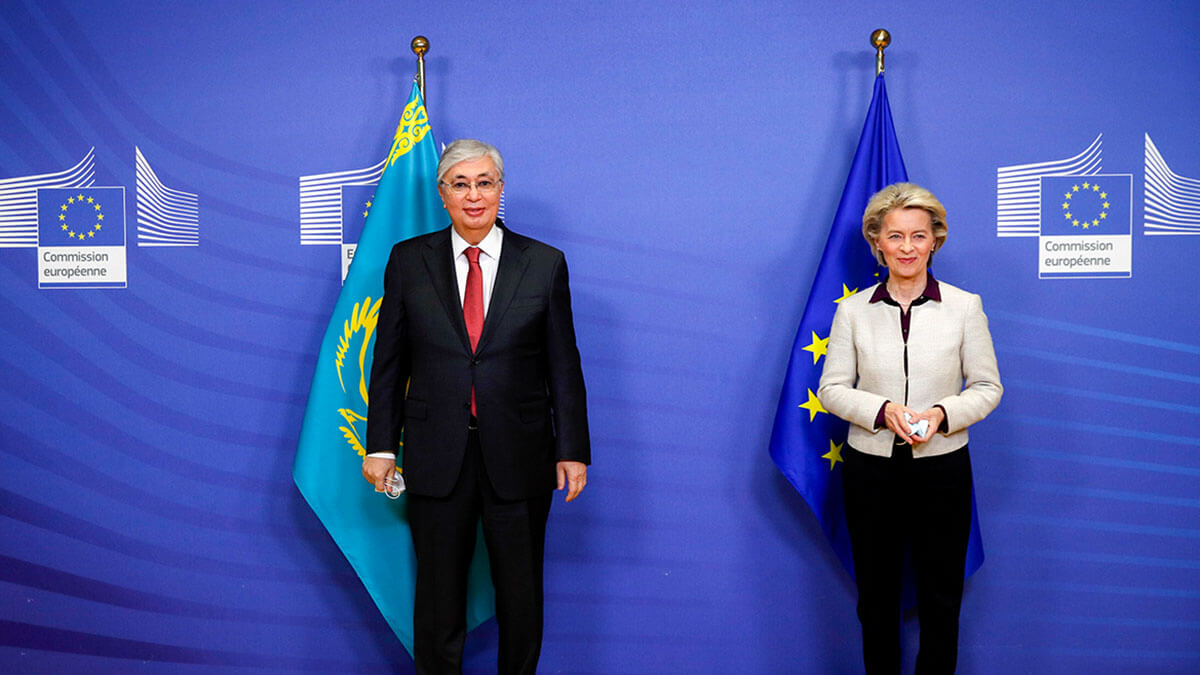
Kazakhstan's participation in the EU Raw Materials Week in November 2023 and its accession to the Minerals Assurance Partnership in 2024 are noteworthy. The EU bloc and Kazakhstan are also preparing negotiations for a visa facilitation agreement and readmission. Kazakhstan plays a significant role in European energy security. The EU also supports the development of renewable energy. Kazakhstan receives EU investment from a specific multi-annual indicative programme for the period 2021-2027 with the aim of implementing the Enhanced Partnership and Cooperation Agreement through a cooperation mechanism for the promotion of sustainable economic growth and the rule of law. Kazakhstan is an active participant in the Erasmus programme and in the Marie Sklodowska-Curie actions under Horizon Europe, where there is exciting potential for Kazakh researchers to participate. The EU has various programmes in Central Asia where both sides can collaborate, as well as on the situation in Afghanistan and other security challenges.
In conclusion, we can say that 2025 will be a year for Kazakhstan where it will continue to strengthen its economy, sovereignty, and external position.
Carlos Uriarte Sánchez, Professor of Law, and international relations analyst


